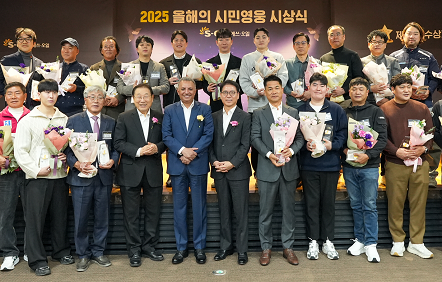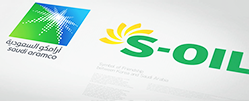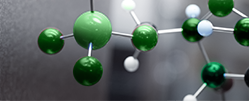Develop Core Competencies for Sustainable Growth
To deal with structural changes in the refining industry, S-OIL has been weighing its future strategic direction in a detailed manner for the last several years. Based on this, the Company has been not only executing revamping projects for improving profitability of existing facilities but also pushing forward with the ‘Residue Upgrading Complex & Olefin Downstream Complex’ project, the biggest investment in its history for the construction of integrated refining-petrochemical facilities. In addition, we are working on construction of the ‘Technical Service & Development (TS&D) Center,’ designed to strengthen our technological competitiveness and to advance the customer service and product development functions, thus reinforcing our R&D capability as the core competency for sustainable growth.
Successfully Complete the ‘Residue Upgrading Complex & Olefin Downstream Complex’ Project
S-OIL is pushing ahead with the biggest project in its history, to construct the most advanced residue upgrading complex adopting state-of-the-art refining technologies and an olefin downstream complex utilizing cost competitive olefin feedstocks from the newly built residue upgrading complex. Upon its completion, the Residue Upgrading Complex will significantly enhance the Company’s profitability by converting heavy fuel oil, which has a value lower than crude oil and is expected to see a decline in market demand and profitability due to stricter environmental regulations, into high value-added gasoline and olefins. Also, it will enable S-OIL to have high level of cost competitiveness in the olefin downstream business by providing olefin feedstocks produced from the low value residue via cutting-edge technologies. The Olefin Downstream Complex, poised to be built together with the Residue Upgrading Complex, will bring unmatched competitiveness in the industry to the Company, through the technology partnership and comprehensive collaboration with a world’s leading petrochemical company as well as low cost olefin feedstocks.
By construction of the Olefin Downstream Complex, S-OIL plans to make forays into the Polypropylene (PP) and Propylene Oxide (PO) businesses to extend its value chain to polypropylene and polyurethane areas. These new businesses will enable S-OIL to cope proactively with the industry trend of applying higher quality materials in the more value-added products used for information technology and biotechnology fields. Also S-OIL seeks to wean the domestic industry off the heavy reliance on imported materials like PO whose domestic supply is limited, thereby creating a stable income stream. This will allow Korean polyurethane industry as well as relevant industries to dramatically better their efficiency and competitiveness.
S-OIL will build up a balanced business portfolio by manufacturing olefin downstream products that are likely to grow steadily in market demand at an annual rate of around 5%, outpacing the demand growth of petroleum products, in addition to its existing businesses, refining, lube and aromatics. S-OIL will consolidate its status as the most profitable total energy company that achieves stable operating outcomes in an ever- changing business environment.
Efforts to Reinforce the Capabilities of Technical Service (TS)
To secure the competitiveness to guarantee a company’s sustainable growth, it is essential to enhance Technical Service (TS) capabilities needed for product development and technical assistance tailored to meet market needs. To this end, S-OIL signed a contract with the Seoul Metropolitan Office in 2014 to enter the R&D Complex in Magok District where it will construct the Fuel Oil/Lube Oil Engine Test Building for the existing fuel business and the Chemical TS Center for expanding TS activities in the olefin downstream business on a site spanning 29,100 square meters.
In particular, given that in the olefin downstream business is the market-oriented business to meet diverse customer needs, the Chemical TS Center will lay the foundation for technical assistance for customers and development of core technology and product to ensure the Company successfully establishes the olefin downstream business. The role of the Chemical TS Center will be further reinforced with the expansion of the olefin downstream business and, in the long term, lead the exploration of new business opportunities and commercialization through competitive new technology. Also, we are promoting cooperation with technology licensors at home and abroad for TS capability enhancement while developing educational programs. To implement TS activities in a more efficient and practical manner, S-OIL is working to establish an organized technology task support system and technology support process. Besides, S-OIL has been in talks for concluding agreement on joint research with prestigious colleges since 2015, dedicating itself to nurturing talents and securing technology.
Implementation of the SUPER(S-OIL Upgrading Program of Existing Refinery) Project
The SUPER project is being undertaken for the following three purposes: first, increasing the production capacity of high value-added diesel through revamping the existing residue upgrading complex; second, securing higher process volume and quality of aromatics and lube base oil through revamping production facilities; and third, reducing operating costs, raising energy efficiency, and improving process reliability based on long-term plans.
Following the approval for investment by the Board of Directors in 2014, the SUPER project has been continuing in three phases (Package 1, 2, and 3) on the EPC contract basis in consideration of the project scale and implementation feasibility. The three phases will be completed by November 2015, November 2016, and May 2017, respectively.
In 2015, S-OIL successfully completed the upgrade of the hydrocracking complex, resulting in increasing production volumes of high value-added diesel, kerosene, and lube base oil beyond the plan. The production volume of petrochemicals such as paraxylene also rose backed by the timely completion of the first stage of revamping the aromatic complex.
In 2016, S-OIL plans to complete revamping of the lube base oil production complex, the RFCC complex, and the ultra low sulfur diesel production complex, followed by an upgrade of the aromatics production complex scheduled for 2017. Upon the completion of these projects, our competitive edge in main businesses will be further solidified. S-OIL will continue to develop, plan, and implement the next SUPER projects to revamp major production facilities and secure high profitability.
Response to Climate Change
The world has finally joined hands in responding to climate change in December 2015 when 195 nations submitted their commitments on greenhouse gas emission cuts during COP21 in Paris. Korea pledged to cut greenhouse gas emissions by 37% on the basis of BAU by 2030. As part of this commitment, Korea introduced the Emissions Trading scheme in 2015.
S-OIL also joins the global effort in responding to climate change by analyzing risks and opportunities in line with this change and reflects them in management activities.
Response to Climate Change : Classification, Item, Action Table.
| Classification |
Item |
Action |
| Regulatory |
Risks |
· GHG & Energy Target Management System
· Emissions Trading
|
· Increasing energy efficiency and
· reducing Opportunities GHG emissions
· Emissions Trading
|
| Opportunities |
Upgrading strategic carbon management |
Business
environment |
Opportunities
& Risks |
Evaluation by investors and NGOs |
Participating in public policies
and initiatives |
Opportunities
& Risks |
Changes in demand for products |
Diversifying business portfolio through
pre-emptive investments |
| Physical |
Risks |
Natural disasters like typhoon,
heavy rain, etc. |
Building systems such as IDAS to cope
with natural disasters |
Advancement of Strategic Carbon Management System
In its pre-emptive response to the Government’s climate change policies, S-OIL has established and put in place a strategic carbon management system in 2012. S-OIL has been employing effective and proactive measures to keep abreast with carbon regulations based upon the continued enhancement of its internal capabilities; set mid and long-term GHG reduction targets in connection with investment plans; cost reduction via concrete planning; and feasibility studies with regard to carbon cost prior to investment decisions.
S-OIL will also continue to overhaul low-efficiency processes via its GHG management IT system that analyzes carbon intensity of each process.
Reduction of GHG Emissions through Energy Efficiency Upgrade
S-OIL promoted a total of 17 projects for waste heat recovery and process improvement in 2014. Most notably, by installing an additional Mechanical Vapor Re-compressor (MVR) that recovers waste heat on the PX production process, the Company has saved KRW 39 billion in fuel costs and 140,000 tons of GHG emissions annually. In addition, S-OIL completed an energy optimization project for local communities with idle energy; it sourced from the closely-located LS-Nikko Copper and Korea Zinc Company, curtailing 140,000 tons of GHG emissions each year. Consequently, our GHG emissions in terms of basic units decreased 4.5% from the previous year, and 14.6% compared to 2011.
Participation in Public Initiatives
S-OIL makes a wide array of efforts to build a national consensus on addressing climate change. As part of this, the Company obtained the "Carbon Trust Standard," a global carbon management certification, in 2012 for the first time in Korea, and has renewed the certification every two years. We have also been selected as the excellent company of the Carbon Disclosure Project (CDP) for four consecutive years since 2012.
Furthermore, as a member of the "Korea Business Council for Sustainable Development (KBCSD)" which was launched to promote government-industry cooperation on sustainable growth, we worked to encourage businesses to take proactive measures against climate change, for example, by announcing the "Sustainable Korea 2030" with KBCSD and advising the Government on policy making.
S-OIL is promoting a power generation project by recycling waste heat. This project is expected to improve the energy efficiency in local communities and reduce 61,000 tons of greenhouse gas every year. In addition, we have been organizing the Eco Campaign since 2012 to raise consumers' awareness of carbon reduction. Last year's campaign to stop car engine idling was particularly well received by car drivers.
Business Diversification through Proactive Investments
S-OIL has undertaken large-scale energy and facilities investment projects for the purpose of securing flexibility in response to changing product demands caused by environmental regulations or climate change. These projects will lay the foundation for us to make inroads into the high value-added market represented by advanced materials.
Establishment of Natural Disaster Response System
Climate change has led to an increase in frequency and magnitude of natural disasters like typhoons or torrential rainfall. In order to minimize the negative impact of natural disasters on people and properties, S-OIL has drafted scenarios which simulate disasters and contain detailed action plans for suspension and resumption of work stage by stage, while conducting regular emergency drills based on these scenarios. Also, with the Intelligent Diagnostic Alert System (IDAS) in operation, S-OIL stands ready to put into action mode in a quick and proper manner, when a natural disaster strikes.












